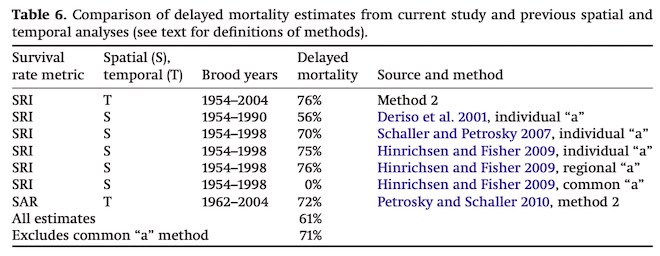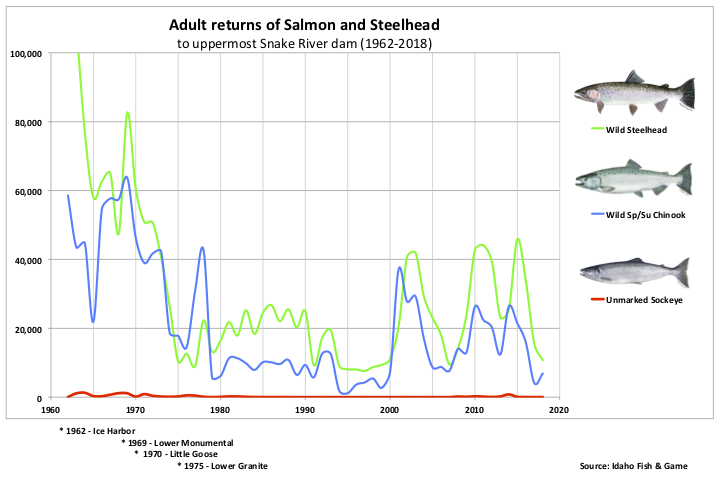forum
library
tutorial
contact

Salmon Science Dispute Rages
by Eric BarkerLewiston Tribune, January 15, 2021
|
the film forum library tutorial contact |

|
Salmon Science Dispute Ragesby Eric BarkerLewiston Tribune, January 15, 2021 |
Researchers say scientist David Welch's ocean study findings ignore key data
 A controversial study pinning blame for poor salmon returns mostly on ocean conditions and largely dismissing freshwater influences is getting pushback from scientists who have long said dams play an important role in survival rates.
A controversial study pinning blame for poor salmon returns mostly on ocean conditions and largely dismissing freshwater influences is getting pushback from scientists who have long said dams play an important role in survival rates.
The Fish Passage Center and others have criticized a paper by British Columbia, Canada, scientist David Welch that was funded by the Bonneville Power Administration and published in the online journal Fish and Fisheries in October.
Welch and his colleagues compared smolt-to-adult return rates from chinook runs in rivers up and down the west coast of North America and said survival has fallen dramatically in dammed and undammed rivers, and in rivers that are largely pristine and those that have been heavily altered.
They also said return rates for Snake River chinook that are protected under the Endangered Species Act are no worse and in some cases better than runs in many undammed rivers.
Their implication is that the ocean plays a dominant role in survival, so much so that well-intentioned efforts in freshwater, ranging from spawning and rearing habitat improvement projects to things like spilling water at dams or even dam removal, is not the best use of limited resources.
"At the broadest level, the major implication of our results is that most of the salmon conservation problem is determined in the ocean by common processes," they wrote in the paper.
Scientists at the Fish Passage Center, an agency established by the Northwest Power and Conservation Council that provides technical assistance to fish and wildlife agencies in the Columbia Basin, reviewed the paper at the request of the Washington and Oregon departments of fish and wildlife, and found several faults with the work. The Fish Passage Center review said, among other things, that Welch and his colleagues used data sets that were not comparable, and the data used by Welch doesn't support a coastwide decline of salmon survival. It said the Welch team ignored evidence that didn't support the paper's conclusions, such as Fish Passage Center reports showing chinook runs in the Columbia Basin that pass few dams have higher survival than those in the Snake River that must pass eight dams.
Michele DeHart, director of the Fish Passage Center, agreed ocean conditions are important. But she said salmon have complex life histories that include both juvenile and adult stages that occur in freshwater and those stages are also important. Additionally, she said whether ocean conditions are good or bad, humans can help boost salmon survival by improving freshwater survival.
 "If the ocean conditions are really bad and your objective is to get as many adult fish back to the river as possible, your management strategy is to do everything you can to get the highest possible survival in freshwater, to get as many smolts out ot the ocean as possible, to get as many adults back as possible," she said.
"If the ocean conditions are really bad and your objective is to get as many adult fish back to the river as possible, your management strategy is to do everything you can to get the highest possible survival in freshwater, to get as many smolts out ot the ocean as possible, to get as many adults back as possible," she said.
Charlie Petrosky, a retired Idaho Department of Fish and Game fisheries researcher, said conditions in the ocean and in rivers are important.
"All the evidence we have seen is it's both, and basically (Welch) kind of bypassess all of that literature on the effects of freshwater variables on survival," he said.
Welch is responding to the criticism. He said in a phone interview that the Fish Passage Center is ignoring data that it doesn't like. For example, he agreed that chinook runs on the Yakima and John Day rivers have much better survival than runs on the Snake River. But he said there are other tributaries to the lower and middle Columbia where chinook are struggling.
"We see that pattern repeated up and down the coast, with some populations having high survival and some having low survival," Welch said.
The scientific dispute is slated to be reviewed in the coming months by a neutral arbiter, the Independent Scientific Advisory Board, an entity of the Northwest Power and Conservation Council. The result could help shape current and future efforts to assist Snake River salmon.
Welch said he welcomes the scrutiny.
"I call it as I see it. It doesn't necessarily mean that I am right," he said. "I currently don't see eye-to-eye with the Fish Passage Center and never have agreed with their single-minded focus on the dams as the primary problem."
The Welch study is available here. The Fish Passage Center's response can be viewed here.
learn more on topics covered in the film
see the video
read the script
learn the songs
discussion forum
